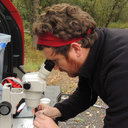Mercurialis annua: characterization of main allergens and cross-reactivity with other species.
Parole chiave
Astratto
A multicentric study was conducted to evaluate the frequency of Mercurialis annua pollen sensitization in several areas of Spain and to select a population sample to characterize the main allergenic components in M. annua pollen. Patients were recruited from six hospitals in Spain. Out of 420 patients sensitized to pollens, 195 (46.4%) showed positive skin tests to M. annua, thus evidencing the high level of sensitization to the pollen of this plant in Spain. Thirty-seven sera with RAST class values to M. annua > or = 3 were selected for SDS-PAGE immunoblotting analysis. Two main allergenic components with molecular weights of 15.8 and 14.1 kD were detected in 59 and 51% of the sera, respectively, and they were identified as profilins. Isolation of the relevant allergens was made by affinity chromatography on a poly-L-proline-Sepharose column, followed by gel filtration and anion exchange chromatography in the micropreparative SMARTs System. A significant but low antigenic cross-reactivity between M. annua and Olea europaea, Fraxinus elatior, Ricinus communis, Salsola kali, Parietaria judaica and Artemisia vulgaris was demonstrated by several in vitro techniques.


